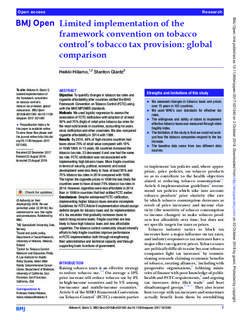| dc.contributor.author | Hiilamo, Heikki Tuomas | |
| dc.contributor.author | Glantz, Stanton | |
| dc.date.accessioned | 2020-02-04T13:33:51Z | |
| dc.date.available | 2020-02-04T13:33:51Z | |
| dc.date.created | 2018-10-22T11:11:35Z | |
| dc.date.issued | 2018 | |
| dc.identifier.citation | BMJ Open. 2018, 8 (10), . | nb_NO |
| dc.identifier.issn | 2044-6055 | |
| dc.identifier.uri | http://hdl.handle.net/11250/2639619 | |
| dc.description.abstract | Objective: To quantify changes in tobacco tax rates and cigarette affordability after countries ratified the WHO Framework Convention on Tobacco Control (FCTC) using with the WHO MPOWER tandards.
Methods: We used logistic regression to assess the association of FCTC ratification with adoption of at least 50% and 75% (high) of retail price tobacco tax rates for the most sold brands in countries, ccounting for years since ratification and other covariates. We also compared cigarette affordability in 2014 with 1999.
Results: By 2014, 44% of high-income countries had taxes above 75% of retail value compared with 18% in 1998/1999. In 15 years, 69 countries increased the tobacco tax rate, 33 decreased it and one had the same tax rate. FCTC ratification was not associated with implementing high tobacco taxes. More fragile countries in terms of security, political, economic and social development were less likely to have at least 50% and 75% tobacco tax rates in 2014 compared with 1999. The higher the cigarette prices in 1999 the less likely the countries were to have at least 75% tobacco tax rates in 2014. However, cigarettes were less affordable in 2014 than in 1999 in countries that had ratified FCTC earlier.
Conclusions: Despite widespread FCTC ratification, implementing higher tobacco taxes remains incomplete. Guidelines for FCTC Article 6 implementation should assign definite targets for tobacco taxes and for implementation of a tax escalator that gradually increases taxes to match rising income levels. Fragile countries are less likely to have high tobacco taxes and less affordable cigarettes. The tobacco control community should intensify efforts to help fragile countries improve performance in FCTC implementation both through strengthening their administrative and technical capacity and through supporting basic functions of government. | nb_NO |
| dc.language.iso | eng | nb_NO |
| dc.publisher | BMJ Publishing Group | nb_NO |
| dc.relation.uri | https://bmjopen.bmj.com/content/8/10/e021340 | |
| dc.subject | tobacco tax rates | nb_NO |
| dc.subject | tobacco | nb_NO |
| dc.subject | cigarette affordability | nb_NO |
| dc.subject | WHO | nb_NO |
| dc.title | Limited implementation of the framework convention on tobacco control’s tobacco tax provision: global comparison | nb_NO |
| dc.type | Journal article | nb_NO |
| dc.type | Peer reviewed | nb_NO |
| dc.description.version | publishedVersion | nb_NO |
| dc.rights.holder | OPen Access | nb_NO |
| dc.source.pagenumber | 8 | nb_NO |
| dc.source.volume | 8 | nb_NO |
| dc.source.journal | BMJ Open | nb_NO |
| dc.source.issue | 10 | nb_NO |
| dc.identifier.doi | 10.1136/bmjopen-2017-021340 | |
| dc.identifier.cristin | 1622158 | |
| cristin.unitcode | 251,1,0,0 | |
| cristin.unitname | Fakultet for teologi, diakoni og ledelsesfag | |
| cristin.ispublished | true | |
| cristin.fulltext | original | |
| cristin.qualitycode | 1 | |
